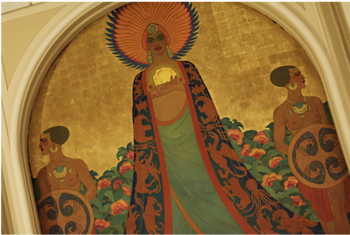By Mark Ellis —

California’s Spanish roots are well known, but the origin of the name California and its linkage to Islam would probably surprise many people.
“The name “California” derives from a 16th Century romance novel written by a Spanish author named Garcia Ordonez de Montalvo,” notes Robert Petersen, in an article for KCET’s online magazine.
The title of the novel is a mouthful: The Exploits of the Very Powerful Cavalier Esplandian, son of the Excellent King Amadis of Gaul.
The Spanish author’s fanciful tale depicts an island situated near the Garden of Eden that was ruled by strong black women. Any man that ventured on to the island was killed and fed to the women’s pet griffins, hybrid creatures with characteristics of lions and eagles.
The mythical island was called ‘California’ in Montalvo’s novel. The most abundant metal on the island was gold – perhaps a prophetic reference to California’s coming Gold Rush several hundred years after the novel was written.
Queen Calafia, the beautiful ‘African American’ ruler of the island exerted enormous influence, “desirous in her thoughts of achieving great things, valiant in strength, cunning in her brave heart, more than any other who had ruled that kingdom before her.”
She was the Oprah of her day.
“Spanish explorers during the 1500s were familiar with the story and applied the name to what is now called Baja California, which at the time, they thought was an island,” Petersen notes. The novel was said to have particularly motivated Hernán Cortés in the discovery of the “island”, which he believed to be along the west coast of North America.
Apparently, Montalvo’s name for the island was influenced by Islamic culture, which ruled Iberia for 781 years until 1492, when the combined forces of Castile and Aragon captured the Emirate of Granada from its last ruler, Muhammad XII.
In 1482 Montalvo was part of a contingent sent to guard Alhama in the Province of Granada, which had recently been captured from the Moors, so the author was caught up in the struggle between Spain and the Moors.
The inspiration for the word California was likely ‘Khalif’, which refers to the civil and religious leader of a Muslim state thought to be a representative of Allah on earth.
Today, radical Islamists such as ISIS believe a Khalifah will unite all Islamic lands and people and subjugate them in a coming worldwide caliphate.
For 400 years, the caliphate was headquartered in Istanbul, Turkey, until Ataturk secularized the country and established the modern state. But Turkey’s current president, Erdogan, is deconstructing secularist Turkey one brick at a time.
“The president of Turkey is openly calling for the re-establishment of the Islamic State, the restoration of its ancient borders and the conquest of Jerusalem,” notes Dalton Thomas, president of Frontier Alliance International. “When the world wakes up from the corona(virus) hangover, we will face the resurrected Caliphate.”
Portions of Montalvo’s novel featured the struggle between Christians and Muslims during the crusades, along with “strong, self-sufficient women who solicited male attention completely on their own terms. This story resonates in California, which has a long history of gender roles being reconstructed,” a place where “race, gender and religion collide,” according to Petersen.
Could the aforementioned Caliphate include California, its namesake? It seems about as far-fetched as a coming Gold Rush, the reconstruction of gender roles, and racial divisions might have seemed when Montalvo’s novel was written in 1526.



